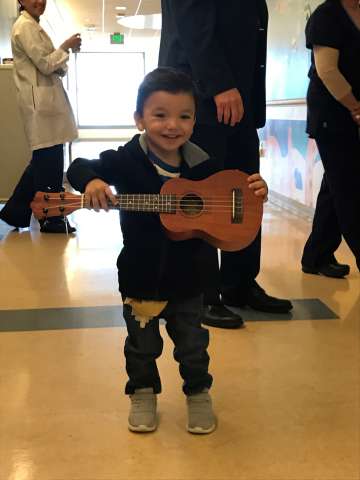Music Therapy
Music therapists support your healing and overall well-being. Our music therapy services are complimentary to all adults and children at a UCLA Health hospital.

UCLA Health Approach to Music Therapy
Music therapy is a specialty that uses research-based musical techniques to improve your physical, mental and emotional well-being. Our board-certified music therapists are part of our robust integrative medicine team. We offer complimentary, optional music therapy services to all children and adults in UCLA Health hospitals.
Additional highlights of our program include:
Collaborative care: Music therapists are an integrated part of your care team. We work closely with your medical providers to ensure you get the support and care you need.
Range of techniques: Our therapists have special training in specific types of music therapy, including neonatal intensive care unit (NICU) music therapy, neurologic music therapy and rehabilitative music therapy. Many of our music therapists are also trained in other therapeutic interventions, such as using art as therapy, meditation or Reiki, an energy healing technique. This expertise allows us to use the techniques that work best for you.
Professional recordings: You may work with a music therapist to write or record songs that bring therapeutic benefits. We can provide professional recordings of these songs at your bedside with our mobile recording unit.
Training and teaching: We help train new music therapists through our music therapy internship . Teaching new therapists demands that we stay current on the latest effective techniques.
What Is Music Therapy?
Music therapy uses music-based tools to help manage health conditions and improve your quality of life. You may listen to music, play an instrument, sing or write songs during music therapy. You don’t need to have musical skills to participate in or benefit from music therapy.
Music therapists are board-certified professionals trained in the clinical use of music. All our music therapists hold a bachelor’s degree or higher in music therapy from a school accredited by the .
Many music therapists also pursue specialty training in specific areas of care. Examples include using music therapy in the neonatal intensive care unit (NICU), during childbirth or for neurological conditions.
How is music therapy different from a musical performance?
Musical performers may aim to provide entertainment, relaxation or stress relief. The goal of music therapy isn’t to entertain. Rather, music therapy can help you achieve specific clinical goals that align with your care plan.
Benefits of music therapy
Therapy sessions often involve and benefit your entire family. They can provide an alternative way to communicate and process difficult events. Music therapy can address multiple aspects of your health, including:
- Cognitive abilities (thinking skills)
- Emotional well-being
- Mental and psychological health
- Physical health
- Social wellness
- Spiritual needs
Working with a music therapist can offer multiple benefits, including:
- Managing anxiety, stress and pain
- Normalizing the hospital environment
- Promoting family bonding and support
- Providing an outlet for emotional expression and support
- Refocusing and relaxing during procedures and routine care
- Supporting cognitive, neurologic, social and emotional development
Who Could Benefit From Music Therapy?
At UCLA Health, music therapy is available to any hospitalized person who wants holistic support during healing. It may be particularly helpful for people who have:
- High levels of emotional distress
- Medical-related trauma or post-traumatic stress
- Neurological conditions or other injuries and need rehabilitation
- Pain
- Palliative care needs
Music therapy is an effective integrative medicine tool to support children in meeting developmental goals. It can also help children maintain developmental milestones, including language and social skills, through long-term hospital stays.
Music therapists tailor their techniques to patients with a wide range of needs. Using passive techniques, we can work with people who are nonverbal or under sedation. We can also support patients who are fully mobile and more active participants.
Music Therapy Techniques and Tools
Music therapists work with you right at your bedside. Sessions may last 15-to-90 minutes, depending on your preferences and care needs. We tailor each session to you. Specific music therapy techniques may include:
- Creating playlists to support your needs
- Life review through creating your own musical timeline
- Live music for guided relaxation and meditation
- Lyric analysis through listening to and discussing music
- Music improvisation and play, including sing-alongs
- Songwriting or recording, including legacy songs for grief support and personalized lullabies (womb songs) that support an infant’s developmental milestones
- Therapeutic lessons with instruments
- Use of rhythm, sound and other musical interventions to support your rehabilitation goals

Meet Our Team
Our music therapists are board-certified specialists. They support your healing while promoting physical, emotional, mental and spiritual well-being. Our team uses a range of techniques tailored to your needs, preferences and goals.
Contact Us
UCLA Health doctors, nurses, social workers, Child Life specialists and other hospital staff can request a music therapy referral on your behalf. All you need to do is ask them. You may also call for questions about music therapy at UCLA Health.
Find Your Care
Music therapists are key members of our integrative medicine team. Call to learn more about our music therapy services.
